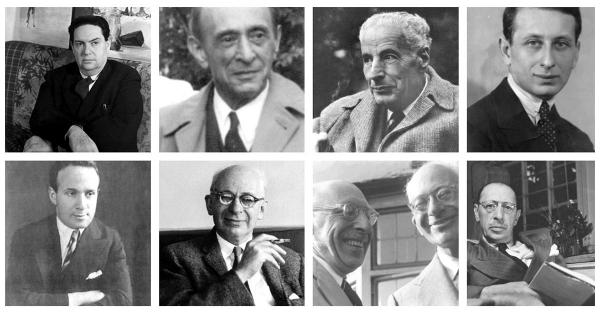REDISCOVER Genesis Suite: A Collaboration of Mythic Proportions

January 09, 2018
Jewish history is filled with legends. Moses’s parting of the Red Sea. Abraham’s binding of Isaac. Due to their inherently dramatic nature, many of those legends have been set to music as cantatas, oratorios or operas. But in the case of one mid-twentieth century piece, the story of the music’s creation is nearly as epic as the legend itself.
Genesis Suite was no small undertaking. The topic was nothing less than the creation of the world. It included seven composers—six of them twentieth century icons, five refugees from the European theater of war, two of them arch enemies and all but one Jewish: Arnold Schoenberg, Nathaniel Shilkret, Alexandre Tansman, Darius Milhaud, Mario Castelnuovo-Tedesco, Ernst Toch, and Igor Stravinsky.
Enter Our Genesis Suite Giveaway
5 Winners Will Receive the Full Album on CD or Digital Download.
Winners will be drawn at random on Thursday, January 18th.
Today, Shilkret is the least known of the seven composers, but the project was his brainchild. A composer and conductor of film, concert and popular music, Shilkret began contemplating a composition based on the Bible early as early as the 1920s.
Shilkret initially endeavored to complete the project himself but became overwhelmed and asked for assistance from Castelnuovo-Tedesco, one of his colleagues at MGM Studios. From there the project snowballed, eventually leading him to commission a separate composer for each of the suite’s seven movements, though apparently more were planned initially. Musicologist James Westby detailed the tangled web of how it all came together in his liner notes for the Milken Archive’s 2004 recording:
Castelnuovo-Tedesco thus gave the last part of the Noah story—The Rainbow—to Toch, and put Shilkret in touch with Tansman, who did Earthly Paradise (later retitled Adam and Eve). Tansman in turn contacted Milhaud, who wrote Cain and Abel, and then contacted Stravinsky, who chose Babel. Finally, Shilkret himself asked Schoenberg, who agreed to give the suite a Prelude that would describe the primordial chaos at the opening of Genesis. Bartók, Hindemith, and Prokofiev were also asked to participate, but their contributions were never received.
Genesis Suite premiered at the Wilshire Ebell Theater in Los Angeles on November 18, 1945, narrated by Edward Arnold with Werner Janssen conducting the Janssen Symphony of Los Angeles. A privately funded recording followed the next month and was issued on 78 RPM discs. An LP with rerecorded narration followed in 1950 and was issued on LP by Capitol Records, which was subsequently reissued on CD in 2001.

Cover art from the 1950 release of Genesis Suite.
But, as Westby notes, “the prospect of any new recording or performance of the Genesis Suite remained an elusive dream for decades.” The piece as a whole had never been published and many of the orchestrations were lost in a fire in Shilkret’s home. Fragments were later discovered through years of painstaking research and a reconstruction commissioned by the Milken Archive was completed by Patrick Russ in 2000.
The Milken Archive’s work on the Genesis Suite has helped breathe new life into this unique collaboration. Our recording has brought this work to the attention of myriad music lovers, and the newly commissioned orchestral reconstructions have made the prospect of performance no longer elusive. The piece has received several performances by major orchestras in recent years.
Coming up on January 13 at 7:30 p.m., Sir Simon Rattle and London Symphony Orchestra will perform Genesis Suite at London’s Barbican Centre. Four leading London stage actors will read the narration, and new light projections will provide a visual interpretation to accompany the music. Read more about the performance, the Genesis Suite, don't forget to enter our giveaway through the links below.
ENTER THE GIVEAWAY »
About the Performance » About the Genesis Suite »
